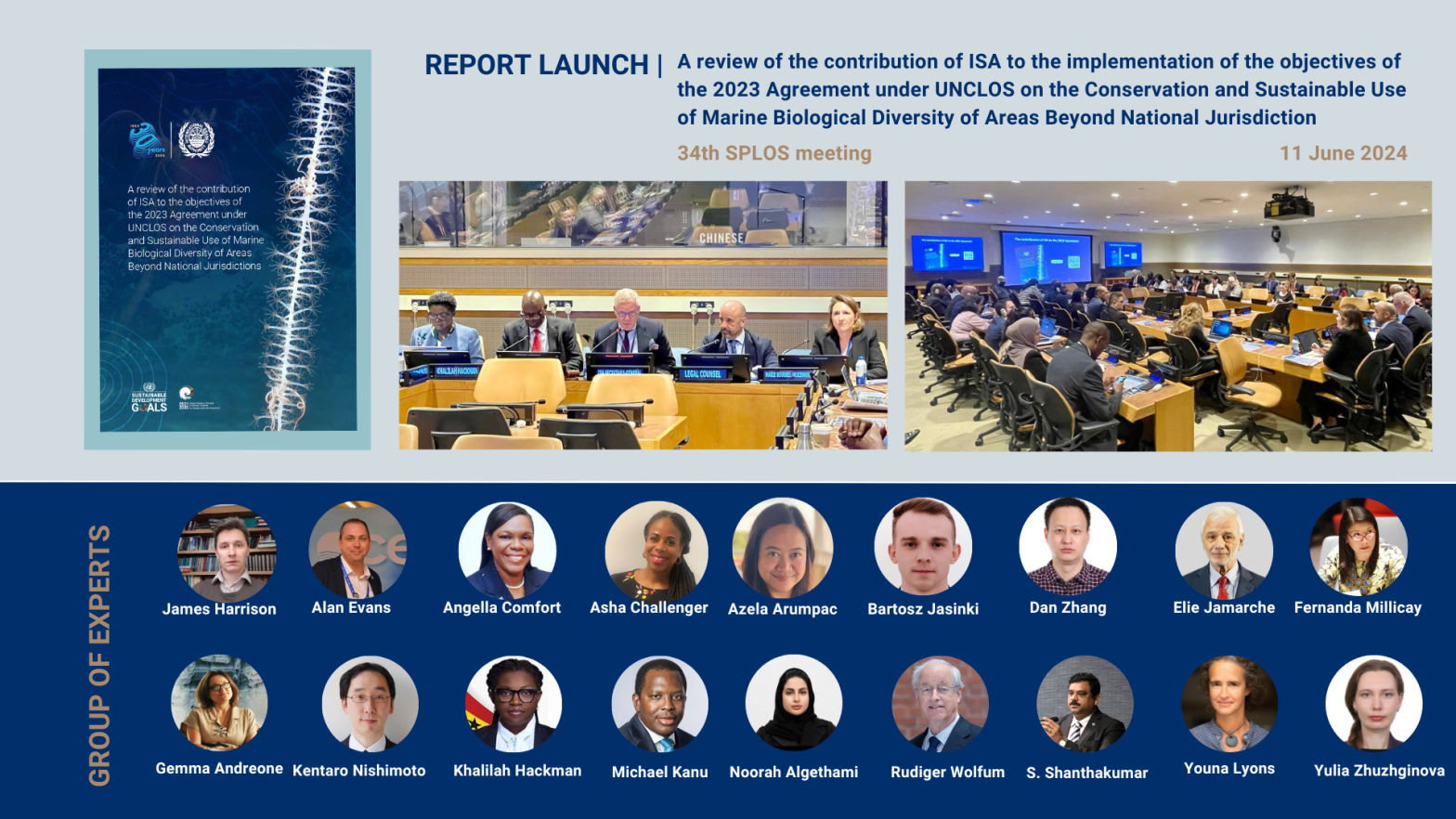New York, 12 June 2024—The Secretariat of the International Seabed Authority (ISA) is pleased to announce the release of a new independent report, “A review of the contribution of the International Seabed Authority to the implementation of the objectives of the 2023 Agreement under the United Nations Convention on the Law of the Sea on the Conservation and Sustainable Use of Marine Biological Diversity of Areas Beyond National Jurisdiction.” The report details the role of ISA and its potential contribution to the objectives of the 2023 Agreement under the United Nations Convention on the Law of the Sea (UNCLOS) on the conservation and sustainable use of marine biological diversity of areas beyond national jurisdictions.
The report benefited from the inputs from a group of experts who donated their time and expertise, providing wise guidance on the structure of the report and important insights into the conclusions and recommendations: Prof. James Harrison, University of Edinburgh (expert consultant), Dr. Gemma Andreone, Ms. Azela Arumpac-Marte, Ms. Asha Challenger, H.E. Ms. Angella Comfort, Mr. Alan Evans, Mr. Elie Jarmache, Mr. Bartosz Jasiński, Ms. Khalilah Hackman, H.E. Mr. Michael Kanu, Ms. Youna Lyon, H.E. Ms. Fernanda Millicay, Ms. Noorah Mohammed Algethami, Prof. Kentaro Nishimoto, Prof. S. Shanthakumar, Prof. Rudiger Wolfrum, Mr. Zhang Dan and Ms. Yulia Zhuzhginova.
The report was officially launched at a side event organized during the 34th Meeting of the States Parties to UNCLOS (SPLOS) held at the United Nations Headquarters in New York.
In his opening remarks, the ISA Secretary-General noted that “The 2023 Agreement is a significant achievement in our global endeavour to conserve and sustainably use marine biodiversity. It introduces new measures for sharing the benefits from the use of marine genetic resources as well as processes for establishing area-based management tools, standards for conducting environmental impact assessments and a suite of tools to promote capacity-building and technology transfer. In so doing, the 2023 Agreement builds on a substantial corpus of existing international law and practice, administered through a wide range of international organizations, bodies and processes.”
“As States consider ratifying the 2023 Agreement, it will be important to consider carefully how these diverse organizations, bodies and processes can best contribute to its effective implementation. The present report is a first contribution to that process because it analyses how the provisions of the 2023 Agreement align with the ISA’s mandate and activities detailing likely challenges and opportunities ahead,” the Secretary-General added.
Mr. Miguel de Serpa Soares, United Nations Under-Secretary-General for Legal Affairs and United Nations Legal Counsel, remarked: “Working in tandem with the mechanism of the BBNJ Agreement, ISA, within its mandate, can, in fact, make an essential contribution to increasing our knowledge of deep-sea ecosystems and biodiversity, thereby supporting environmental impact assessments and informed decision-making on planned activities. Such synergies must be supported by enhanced cooperation and coordination, which is at the heart of the BBNJ Agreement.”
H.E. Ms. Rena Lee, President of the Intergovernmental Conference on an international legally binding instrument under the United Nations Convention on the Law of the Sea on the conservation and sustainable use of marine biological diversity of areas beyond national jurisdiction, noted that “There is no doubt that ISA is one of the key relevant frameworks, institutions and bodies referenced in the BBNJ Agreement that will be interacting with its mechanism, processes and institutions.”
“We should learn from our past experiences because they inform our interactions. The experiences of ISA in cooperating with other relevant global organizations are instructive,” Ms. Lee added.
Key findings of the report in relation to area-based management tools and capacity-building and transfer of technology were presented by Mrs. Khalilah Hackman, Deputy Director of the Legal and Treaties Bureau, Ghana.
Dr. Marie Bourrel-McKinnon, Chief of Staff and Head of the Strategic Planning Unit at the ISA Secretariat, provided an overview of the key findings of the report in relation to marine genetic resources, environmental impact assessment and strategic environmental assessment.
H.E. Mrs. Fernanda Millicay, Minister at the Ministry of Foreign Affairs and Worship of Argentina and former Permanent Representative of Argentina to the International Maritime Organization, highlighted different elements and options identified by the group of experts in relation to general institutional cooperation and coordination between ISA and the treaty bodies established under the 2023 Agreement.
In concluding the event, H.E. Mr. Duncan Laki Muhumuza from Uganda and President of the 34th meeting of the SPLOS, underscored that “Coordination and cooperation will be central to ensuring the success of the 2023 Agreement, particularly in enabling all the institutions established under UNCLOS, including ISA and the treaty bodies to be established under the 2023 Agreement, to work together.”
“There will also have to be diplomatic engagement on the part of SPLOS in order to reach a clear understanding of the mutual supportiveness of the applicable instruments. I commend ISA for such a timely and important report. I am confident it will bring useful elements for consideration as we collectively engage in the identification of the modalities that will condition the success of these different but complementary instruments,” he added.
About ISA
The International Seabed Authority (ISA) is an autonomous intergovernmental organization mandated by the United Nations Convention on the Law of the Sea to manage the mineral resources of the seabed beyond national jurisdiction for the shared benefit of humankind. ISA is committed to the principle that all economic activities in the deep seabed, including deep-seabed mining, must be regulated and responsibly managed using the best available scientific evidence for the benefit of all nations of the world. ISA works to ensure that the voices of all States, including developing States and other stakeholders, are effectively heard in discussions around the sustainable development of the deep seabed.
For media enquiries, please contact:
Mr. Philip Janikowski, Communications Specialist, ISA, pjanikowski@isa.org.jm


